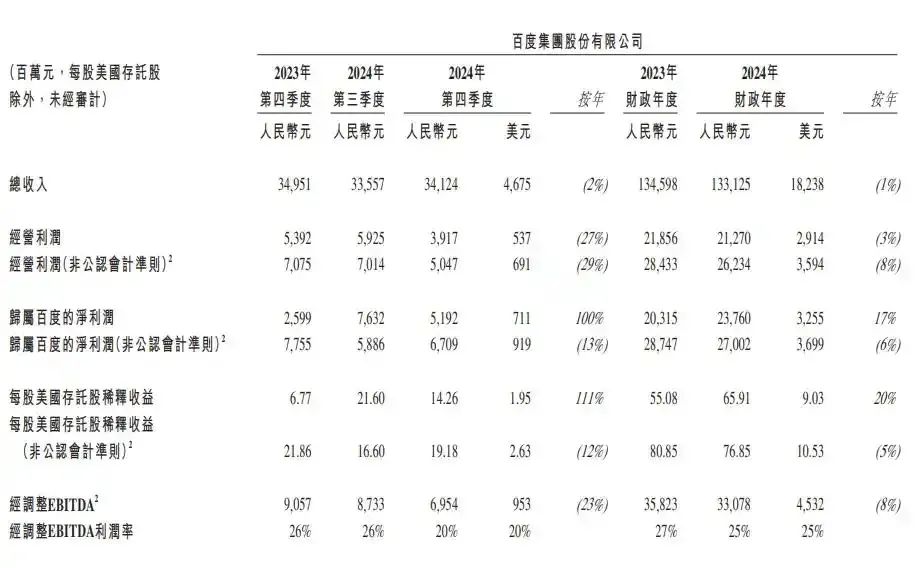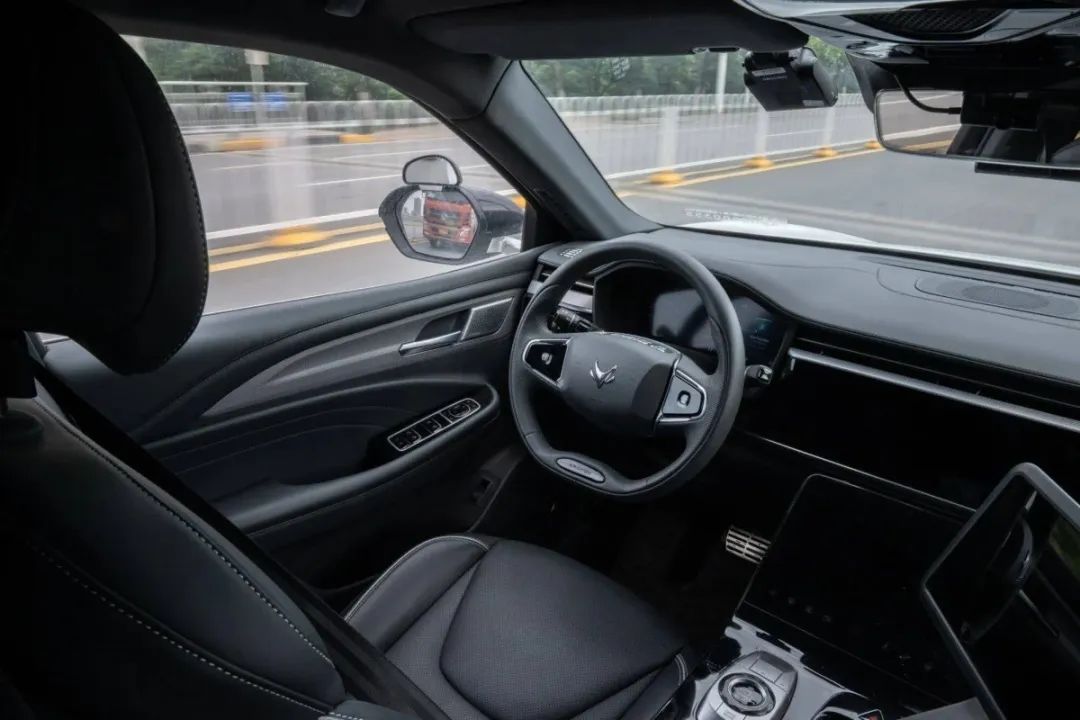Baidu Struggles Amidst Multiple Pressures, Li Yanhong Absent from Conference
![]() 02/19 2025
02/19 2025
![]() 534
534
Baidu finds itself deeply entangled in numerous challenges.
"For 25 years, we have consistently led the technological frontier, firmly believing that innovation is Baidu's core strength."
On January 1, marking the dawn of a new year and the 25th anniversary of Baidu's inception, founder Li Yanhong sent an internal letter to all employees in the evening. The letter clearly conveys his active engagement with the outside world, sharing his insights and Baidu's endeavors.
A month later, on the evening of February 18, Baidu released its financial report for the fourth quarter and full year of 2024.
However, the day before the report's release, on February 17, Baidu's Hong Kong stocks plummeted by nearly 7% in a single day, with a turnover exceeding HK$3.6 billion, shocking the market.
In the eyes of outsiders, this abrupt stock price drop is fueled by both short-term catalysts and deeper reflections on the technological iterations and competitive landscape shifts within the search industry.
Even towards the end of last year, Li Yanhong delivered a ten-thousand-word speech at the review meeting, thoroughly analyzing Baidu's future strategy and intentions for structural adjustments. However, amidst issues like the decline of core business and high-level personnel turmoil, he failed to offer robust solutions.
Baidu is indeed grappling with multiple pressures.
Weak Core Business
According to the financial report, Baidu's revenue last year was 133.1 billion yuan, a year-on-year decrease of 1%, while its net profit attributable to Baidu was 23.8 billion yuan, an increase of 17% year-on-year. Baidu's non-GAAP net profit stood at 27 billion yuan, a year-on-year decrease of 6%.
Baidu's quarterly revenue has declined for two consecutive quarters, with fourth-quarter revenue reaching $34.1 billion, a year-on-year decrease of 2%. Net profit attributable to Baidu was 5.2 billion yuan, an increase of 100% year-on-year, while non-GAAP net profit attributable to Baidu was 6.7 billion yuan, a year-on-year decrease of 13%.
In terms of business segments, Baidu's primary revenue source, the online marketing business, was weak in the fourth quarter, with revenue of 17.9 billion yuan, a year-on-year decrease of 7%. Baidu's non-online marketing revenue was 9.8 billion yuan, an increase of 18% year-on-year, mainly driven by the intelligent cloud business, which saw a 26% year-on-year revenue increase. iQIYI's revenue was 6.6 billion yuan, a year-on-year decrease of 14%.

It is evident from the financial report that Baidu's traditional marketing advertising business has exhibited relatively weak growth, whereas the cloud business, fueled by generative AI, has begun to bolster Baidu's performance.
Li Yanhong once explained in a speech that the current advertising business is under pressure from various external factors, including macroeconomic uncertainties and intensifying industry competition. Simultaneously, the search business has faced considerable internal challenges due to innovations in AI technology.
"The traditional search engine business model essentially serves as an intermediary for traffic distribution. The rise of AI-native search is rewriting the rules of the game. The transition from information retrieval to knowledge production transforms search behavior into a productivity tool, which will inevitably have a significant impact on the past advertising model of search," analyzed industry insiders.
Despite the challenges, there are highlights in the financial report. Data shows that in December 2024, the daily average invocation of the Wenxin large model reached 1.65 billion times, a 33-fold increase over the year. In the same month, Baidu Wenku AI MAU reached 94 million, an increase of 216% year-on-year and 83% month-on-month. Driven by AI, Baidu Intelligent Cloud is experiencing rapid growth, with fourth-quarter revenue increasing by 26% year-on-year.
To a certain extent, this growth has indeed compensated for the decline in Baidu's online marketing revenue.
"2024 marks a crucial year for us to shift from an Internet-centric approach to prioritizing artificial intelligence. As our full-stack AI technology gains widespread market recognition, the growth momentum of intelligent clouds is becoming increasingly strong. In the mobile ecosystem, we have been steadfastly promoting the AI-native reconstruction of search to enhance the user experience," Li Yanhong emphasized.
He firmly believes that as the AI strategy continues to be validated, the investments related to AI are expected to yield greater results in 2025.
However, from a business data perspective, despite highlights in the AI business, after the demographic dividend disappears, Baidu's core product monthly active user growth is sluggish, and its generative AI C-end product Wenxiaoyan is also facing the challenge of slowing growth.
Previously, research institution QuestMobile data revealed that as of the end of November 2024, the total monthly active users of China's AIGC APP surpassed 100 million. Doubao, a subsidiary of ByteDance, has shown a steep upward curve, with monthly active users of Kimi intelligent assistant on the dark side of the moon exceeding 10 million, while Baidu's Wenxiaoyan has seen slowing growth and ranks third.
Particularly as search becomes a standard feature of AI tools, the rise of AI search products like Quark, Nano, and Mita, coupled with the breakthrough of the DeepSeek open-source large model, undoubtedly spurs Baidu to accelerate a series of actions, reflecting both the transformation of Baidu's AI strategic considerations and market anxiety.
According to Tencent Cloud news, Tencent has announced the integration of DeepSeek and continues to expand more application scenarios. In the eyes of outsiders, WeChat, as a super app with over 1 billion users, its enhanced AI search function may pose a direct threat to Baidu's search business.
Poor Results in Intelligent Driving
Among Baidu's new AI businesses, the cloud business drives overall revenue growth, while intelligent driving is responsible for "telling stories."
However, this story turned into an "accident" last year.
The sudden collapse of Jiyue Automobile at the end of 2024 is still fresh in the industry's memory. This high-end smart car brand jointly created by Baidu and Geely Holding Group was once hailed as a model of cooperation between the two parties but ultimately ended in disappointment.
In fact, in the early stages of Jiyue Automobile's establishment, Baidu poured much-anticipated enthusiasm into it. According to Baidu's financial report, Baidu has invested a total of approximately 8.8 billion yuan in Jidu (the predecessor of Jiyue Automobile).

In the following two years, Li Yanhong introduced the concept of "automotive robots" and repeatedly stood up for Jidu. Jidu's marketing activities were also tied to Baidu – the concept car was released in the metaverse developed by Baidu and displayed at important Baidu events and parks, among others. Baidu's Intelligent Driving Group (IDG) also formed a dedicated team to provide tailored services for Jidu, ensuring it could take the lead in utilizing Baidu's latest technologies and products.
Yet, the crowded Chinese automotive market did not grant Jiyue an opportunity.
Especially when compared with the ambitious goals set when it started building cars in January 2021, it seems that Baidu and Geely, the two major shareholders, have little capacity to support such a loss-making venture.
The rest is history.
Nonetheless, Baidu is indeed one of the earliest domestic enterprises to venture into the field of intelligent driving. It began its layout as early as 2013 and established the Intelligent Driving Business Group in 2017, releasing the "Apollo Plan" in the same year. At that time, most new entrants had not even started.
Like Huawei, the "latecomer," Baidu also claims to offer a comprehensive suite of intelligent automotive solutions. For instance, in the cabin level, Baidu has Baidu CarLife OS and Baidu Voice SDK and is also a provider of automotive maps and high-precision maps. In short, Baidu is involved in virtually all aspects of the smart car field.
However, Li Yanhong can now only rely on Luobo to see if it can speed ahead in the realm of intelligent driving.
In the fourth quarter of 2024, Luobo Auto provided over 1.1 million self-driving orders, a year-on-year increase of 36%. In January 2025, Luobo Auto cumulatively provided over 9 million self-driving travel service orders to the public. Since February 2025, Luobo Auto has achieved 100% fully autonomous driving operations nationwide.
Nonetheless, the growth rate of orders for the highly anticipated Luobo Auto has also slowed significantly. This is primarily due to the fact that Luobo Auto's business scope is confined to specific areas in a few cities, thereby limiting the growth of order volume.
In December last year, according to media reports, Baidu's Intelligent Driving Group (IDG) has transferred to a new entity for operation and needs to formulate and complete annual revenue targets.

It is evident that Baidu is eagerly seeking revenue generation from its intelligent driving business.
The industry generally agrees that even if Baidu's new AI business has reached the profitability stage after substantial investment, the cloud and intelligent driving businesses have always faced fierce competition from giants like Huawei and Google, as well as more severe risks related to capital and business expansion, and the future is not entirely rosy.
For instance, competitors such as Huawei have made rapid progress in cooperation and implementation in the field of intelligent driving. Therefore, the market has also questioned Baidu's ability to commercialize AI technology, exacerbating the decline in Baidu's stock price.
Currently, the battle in the search industry has shifted from "traffic competition" to "intelligent upgrading." If Baidu aims to stabilize its position, it needs to balance AI investment and revenue pressure in the short term and, in the long term, prove the commercialization potential of new businesses like autonomous driving. If it fails to narrow the gap with Tencent in terms of technology response speed and ecosystem construction, its market position may further waver.
On the morning of February 17, a high-profile private enterprise symposium was held, attended by leaders of renowned enterprises such as Tencent, Alibaba, and Huawei, but Li Yanhong was absent. This absence has further heightened market concerns about Baidu's policy support and industry status.
Note: Some images are sourced from the internet. If there is any infringement, please contact us for deletion.








